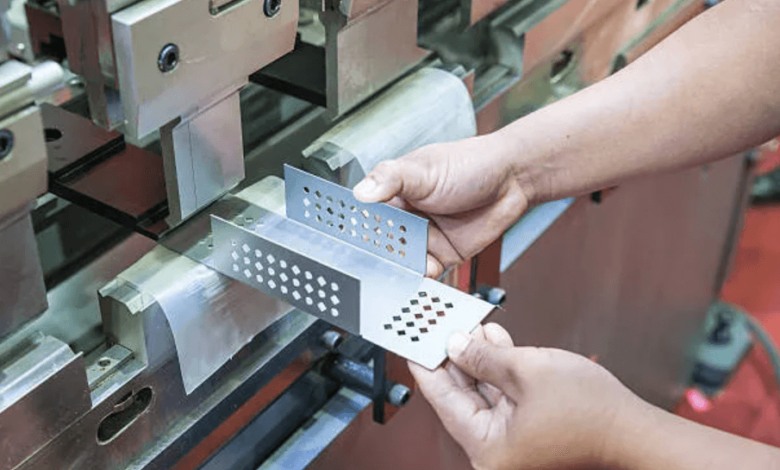Understanding Sheet Metal Stamping Services

Introduction
In the modern manufacturing world, Sheet Metal Stamping Services are crucial for producing complex components with high accuracy, efficiency, and cost-effectiveness. Whether used in the automotive industry, consumer electronics, or industrial machinery, stamped metal parts form the backbone of various products. This article explores what sheet metal stamping entails, the types of stamping processes available, the benefits, applications, and what to look for in a stamping service provider.
What Is Sheet Metal Stamping?
Sheet metal stamping is a cold-forming manufacturing process where flat sheets of metal are shaped into specific forms using a stamping press and die. This high-speed, high-precision method is ideal for producing large volumes of metal parts consistently. Sheet metal stamping services typically include several operations like punching, bending, embossing, coining, and flanging.
Common Materials Used
Stamping services work with a range of metals, each suited for different applications. Commonly used materials include:
- Copper and Brass: Excellent conductivity and aesthetics, ideal for electrical components.
The choice of material impacts the stamping method, tooling design, and final application of the component.
See also: Unlocking Bookkeeping Secrets for Business Growth Tech Trends Gfxprojectality
Key Stamping Techniques
Sheet metal stamping is not a one-size-fits-all process. Several methods are employed depending on the complexity and requirements of the part.
Transfer Die Stamping
In this technique, a part is transferred from one station to another within the same press using a mechanical transport system.
Blanking and Piercing
These operations are often performed at the beginning of the stamping process.
Benefits of Sheet Metal Stamping Services
Precision and Repeatability
One of the main advantages of metal stamping is the ability to produce highly accurate and consistent parts over long production runs. This is essential for industries where tight tolerances are non-negotiable.
High-Speed Production
This makes it cost-effective for both medium and large-scale manufacturing.
Reduced Waste
With optimized tooling and nesting strategies, metal stamping minimizes material waste, contributing to both environmental sustainability and cost savings.
Versatility
Sheet metal stamping services can be applied to a wide variety of industries, designs, and materials. Whether producing flat washers or intricate brackets, stamping adapts to diverse manufacturing needs.
Applications in Major Industries
Automotive
The automotive sector is one of the biggest consumers of stamped metal parts. From body panels and frames to engine components and seat structures, stamping ensures structural integrity and lightweight performance.
Electronics
Metal stamping produces housings, brackets, connectors, and shields for consumer electronics and communication devices. Its ability to maintain high precision at micro scales is invaluable.
Aerospace
Appliances and Consumer Goods
Stamped parts are found in washing machines, refrigerators, and kitchen appliances. Stamping offers the reliability and aesthetic appeal manufacturers require for consumer products.
Industrial Equipment
Metal stamping is also used in agricultural machinery, HVAC systems, and other heavy equipment. The process ensures parts that can withstand tough environments and mechanical stress.
Choosing a Sheet Metal Stamping Service Provider
Selecting the right provider for Sheet Metal Stamping Services can significantly influence the success of your project. Key considerations include:
Experience and Technical Expertise
A company with extensive experience in your industry is more likely to understand your requirements and offer innovative solutions. They should also have in-house engineering support to assist with part design and tooling development.
Advanced Equipment
Modern CNC stamping presses, robotic automation, and high-speed die change systems increase efficiency and reduce lead times. Ask about the type of machinery and technologies the provider uses.
Material Handling Capabilities
Ensure the provider can handle your chosen material, especially if you’re working with high-performance alloys or specialized surface finishes.
Quality Assurance
These demonstrate the company’s commitment to quality management and continuous improvement. A good provider will offer dimensional inspection, hardness testing, and part validation.
Prototyping Services
Before mass production, prototyping helps validate design and functionality. Leading stamping services offer rapid prototyping, allowing you to make adjustments before committing to tooling.
Turnaround Time
Fast and reliable delivery is essential. Choose a supplier that can meet your deadlines without compromising on part quality.
Emerging Trends in Metal Stamping
The sheet metal stamping industry is evolving with technological advancements:
Digital Twin Technology
Digital models of stamping tools and parts allow engineers to simulate processes before production, reducing errors and optimizing performance.
Conclusion
Sheet Metal Stamping Services play a critical role in today’s manufacturing ecosystem. The ability to produce accurate, durable, and cost-effective parts at high speeds has made stamping the go-to solution for a wide range of industries
When selecting a stamping service provider, companies should evaluate technical capabilities, quality assurance practices, equipment, and customer service. As technology continues to evolve, so too will the efficiency, precision, and sustainability of sheet metal stamping — making it an even more valuable tool in global manufacturing.



